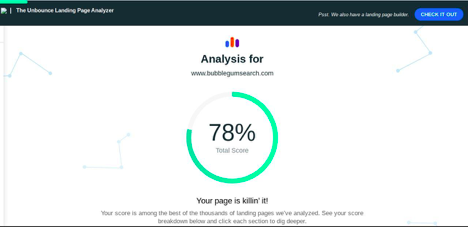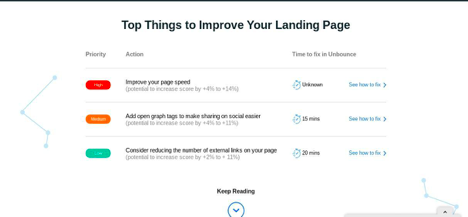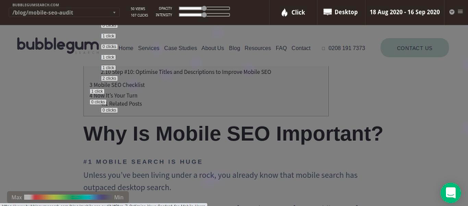30-second summary:
- On-page SEO is one of the most effective ways to boost your organic search engine rankings, improve your website’s user experience (UX) offerings, and grow your business consistently.
- But, without understanding your audience and measuring your results, how can you make changes or create strategies that actually make a difference? In short, you can’t.
- To help you enhance your search engine optimization activities and grow your business, here we explore three uncommon on-page SEO analysis techniques, complete with examples, that you should use to your advantage.
With so many on-page elements to optimize, knowing where to start and what to prioritize can seem impossible. But don’t worry, because we’re going to show you three unique on-page SEO analysis techniques, as well as the exact tools we use at Bubblegum Search, to make the entire process easy and effective in equal measures.
Once you’ve got the insights and discoveries gained from these practical on-page analysis techniques, we’re confident you will earn higher engagement, increased rankings, and more conversions.
Disclaimer before we get started, we’d just like to say that we’re not affiliated with any of the tools mentioned in this guide—they’re platforms we find helpful for on-page SEO analysis techniques and other great alternatives likely exist too.
1. Improved UX content and functionality
Studies show that just one dollar invested in user experience (UX) offers an average return on investment (ROI) of $100 ( that equates to an ROI rate of 9,900%).
By making enhancements to the usability of your website pages, you will create a frictionless user experience. If you understand your users’ intent through analysis and research, you will ensure the messaging, design elements, and layout of your webpage provide an answer to a specific question.
In doing so, you’ll simplify the user experience by guiding the visitor through their journey, helping them to achieve their goal. Let’s look at our example:
To test specific performance and functionality-based elements of your web or landing pages, the Unbounce Landing Page Analyzer is a powerful tool:

By entering a specific URL and outlining your page’s target key terms, Unbounce’s intuitive algorithm will provide a report that offers an overall page score while drilling down into relevant UX-centric elements.
In addition to page speed performance, content relevance, and trust & security ratings, Unbounce’s on-page analyzer tool offers a score on Message Match.
When it comes to SEO, content really is king. If your on-page copy is rich, engaging, and fulfills its promise, you will increase your chances of ranking well for relevant search terms exponentially.
As Unbounce quantifies all of these essential UX and performance-based elements, you can benefit from a clear-cut snapshot of the elements that are currently working well and what needs improvement.
As you can see from the example, the overall page score of 78% suggests that the Bubblegum Search homepage is well optimized for UX and SEO. The report also shows that while trust and Message Match is at 100%, the page could benefit from improved conversion-centric design.
In addition to these invaluable insights, Unbounce’s page report also provides a color-coded priority list of detailed actions to help optimize overall page performance.

These data-driven insights are based on specific tactics and strategies you can use, designed to make your web pages more engaging, more functional, and as a result, optimized for improved SEO performance.
2. Multimedia and content enhancement
Not only does inspiring, value-driven content drive engagement but it also helps in creating a healthy, SEO-boosting backlink profile.
Compelling copy, eye-catching imagery, videos, and well-designed on-page multimedia content make powerful on-page SEO boosting assets.
One of the most effective methods of analyzing the success of your on-page content, in terms of user engagement, is through heat mapping.
Heatmaps are essentially interactive data visualization tools that provide practical insight into how your website visitors interact with your web page and the content contained within it.
With heat mapping, you can learn about user intent and ultimately understand how to optimize your webpage content better for maximum SEO success.

From the Mouseflow heatmap (screenshot above), you can gain a definitive snapshot of where users are focusing their attention, scrolling, and clicking when engaging with any of your pages.
By focusing on click and scroll rates, you can see the percentage of visitors that drop off before ever seeing the curtain content lower down on the page.
If the content further down the page earns a lot of clicks or attention but a low percentage of views, positioning this copy higher up the page, for example, will help offer more value, increase user satisfaction, and boost dwell time, enhancing the overall performance of the content as a result.
When it comes to understanding the value and relevance of your on-page content, heat mapping is invaluable—and an Onpage SEO analysis technique worth your time and investment.
3. Mobile-first design optimization
We live in a time where there are more smartphones on the planet than humans.
To succeed in today’s world, adopting a mobile-first approach is essential—and if you fail to optimize your website’s content for tablets and smartphones, your SEO rankings will suffer.
While many CMS’ like WordPress optimize your website content for the mobile experience relatively swiftly and simply, not every platform optimizes web pages for every screen size.
And, by making sure that every aspect of your website is 100% optimized for mobile, you will boost your Mobile SEO rankings while driving more organic traffic to your website.
To understand the specific actions you must take to optimize your on-page content for mobile devices, analytical tools like Window Resizer (a Chrome extension that will help you get your screen resolutions just right) and WooRank will perform audits and provide data on the specific elements of your website that need changing to enhance your content, functionality, and user experience or fix existing errors, which include:
- Mobile-only 404 links
- Design elements and images that don’t fit the screen
- Unplayable multimedia content
- Poorly formatted text
- Blocked JavaScript, CSS, and image files
- Slow loading times
While an experienced web developer will carry out many of the responsive design-based improvements and fix any technical errors, by using mobile optimization analysis software, you can pinpoint any issues on mobile or tablet and work with them collaboratively to ensure the best possible outcome.
Bonus
To achieve complete mobile optimization success, check out our mobile SEO audit checklist.
By exploring these on-page SEO analysis techniques, you will connect with actionable metrics, data, and insights that will make your online offerings more engaging, boosting your brand authority and improving your organic search rankings in the process.
Invest in on-page SEO analysis techniques and you will remain relevant, adaptable, and visible in a digital landscape that is ever-changing. Don’t get left behind—the time to act is now.
Do you have any practical Onpage SEO tips of your own? Please share them with us by leaving a comment below.
Matt Cayless is an SEO Consultant at Bubblegum Search. He is an expert in Search Engine Optimisation having worked on campaigns for some of the world’s biggest brands and has a passion for helping SMEs grow online. When he’s not chasing the Google algorithm he can be found training for his next marathon. You can find him on Linkedin.
The post Three uncommon on-page SEO analysis techniques (That move the needle) appeared first on Search Engine Watch.



